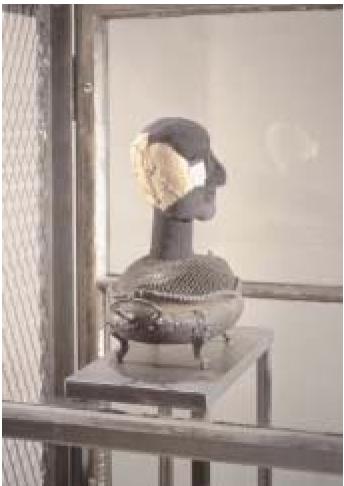Louise Bourgeois
dal 5/3/2004 al 9/5/2004
Segnalato da
5/3/2004
Louise Bourgeois
The Fruitmarket Gallery, Edinburgh
Stitches in Time includes a group of extraordinary life-size sewn fabric busts, several cell-like vitrines housing scenes of torture and ecstasy and totemic figures which reinterpret in fabric some of Bourgeois's very first sculptures from the 1940s and 50s. The sculptures are shown together with two major suites of etchings, the earliest of which is He disappeared into Complete Silence, (1947), Bourgeois's first significant group of etchings and poems in which tales of loss and loneliness unfold.

The first major presentation in the United Kingdom of new work by Louise
Bourgeois, one of the most influential artists of our time, opens at The
Fruitmarket Gallery, Edinburgh, on Saturday 6 March, 2004.
Louise Bourgeois: Stitches in Time includes a group of extraordinary
life-size sewn fabric busts, several cell-like vitrines housing scenes of
torture and ecstasy and totemic figures which reinterpret in fabric some of
Bourgeois's very first sculptures from the 1940s and 50s. The sculptures are
shown together with two major suites of etchings, the earliest of which is
He Disappeared into Complete Silence, (1947), Bourgeois's first significant
group of etchings and poems in which tales of loss and loneliness unfold.
Tough and sometimes very moving, Bourgeois's recent work marks out an artist
who, in her 92nd year, remains at the height of her powers.
The exhibition is organised by the Irish Museum of Modern Art (IMMA),
Dublin, and is the first exhibition in Scotland of Louise Bourgeois's
sculpture.
An uncompromising and original artist, Louise Bourgeois has employed an
astonishing array of modes of practice in her career of more than 60 years
including carving, installation, castings in natural and man-made materials,
text and illustration and needlecraft. Her diverse and experimental art has
engaged with Surrealism, Cubism and Minimalism yet essentially Bourgeois has
remained at one remove from the major 20th century art movements, her
artistic innovation setting its own path.
In 1982, the artist had her first retrospective at New York's Museum of
Modern Art. Subsequent retrospectives followed at Robert Miller Gallery, New
York (drawings) in 1988, Museum of Modern Art, Oxford, England (prints) in
1995, and Musee d'Art Contemporain, Bordeaux, in 1998. Most recently
Bourgeois's dramatic installation I Do, I Undo, I Redo, three life-size
towers featuring spiral staircases, dark enclosures and mirrored platforms
in relationship to a small figure, was the inaugural installation in the
Turbine Hall of Tate Modern, London, in 2000.
Born in Paris in 1911, Bourgeois trained as a painter in Paris and moved to
New York in 1938 after her marriage to American art historian Robert
Goldwater. In the ensuing decade, during which she raised three children,
Bourgeois achieved immediate yet initially short-lived recognition, making
sculptures, prints and performance art that explored the relationship
between architecture and the human body  a recurring motif in her work that
is situated within the artist's own transgressive personal history.
Bourgeois continued making art but it was not until the 1980s that she began
to receive worldwide acclaim.
Bourgeois elevates the importance of autobiography within contemporary art.
To this day, her subjects and materials reflect the psychological impact of
the manipulative relationship between her father, mother and childhood
governess and where it was played out. Her family home in the Parisian
suburbs, steeped in the tapestries of her seamstress mother and the wares of
her antique dealer father, is frequently referenced within the architecture,
furnishings and artefacts of her sculpture.
According to the artist, her works are abstract expressions of emotional
states, drawing on family memories, female sexuality and childhood trauma.
At times disturbing and enigmatic, they are evocative signals to the
darkness of the human spirit - accessible by the often domestic arrangement
of stuffed figures or anatomical forms.
Louise Bourgeois: Stitches in Time is selected and curated by Frances
Morris, Senior Curator, Tate Modern, London, and co-curated by Brenda
McParland, Head of Exhibitions, Irish Museum of Modern Art.
The exhibition marks the commencement of the exhibition programme of Dr
Fiona Bradley, who was appointed Director of The Fruitmarket Gallery in May,
2003.
A book, published by IMMA and August Projects, with an essay by Frances
Morris, accompanies the exhibition.
A series of talks and workshops will accompany the exhibition. In the
gallery reading room, a range of artist resource material and a video
interview presentation of curator Frances Morris discussing the exhibition
will be available.
Information assistants will be on hand for impromptu exhibition tours and to
answer any questions about the gallery and exhibition between 11am and 6pm
Monday to Saturday, and 12 noon to 6pm on Sunday.
The exhibition continues until 9 May, 2004.
The Fruitmarket Gallery is a registered charity, supported by the Scottish
Arts Council, that undertakes to raise 50% of its operation costs via
fund-raising and commercial sponsorship.
Scottish Charity No SC005576
Exhibition Preview
Friday 5 March, 6.30-8.30pm. Admission by invitation only.
Licenced cafe bar open until late
Exhibition
Mon  Sat 11amÂ6pm, Sun 12pmÂ5pm
Admission free
Media Enquiries
Annie Woodman, Media and Marketing Manager
Tel 00 44 (0)131 226 8182
Fax 00 44 (0)131 220 3130
The Fruitmarket Gallery
45 Market Street
Edinburgh



